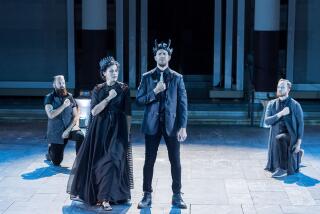Homer’s Essential Insights Lost in Mix
- Share via
Given Howard Rosenberg’s favorable review of NBC’s production of “The Odyssey” (“ ‘Odyssey’ Is Epic Fun Mixing Myth, Brains and Brawn,” May 17), I would like to register some objections from the point of view of a professional classicist.
I am at the usual disadvantage by virtue of having read the book, but I think this production has missed the point in several respects. Your reviewer objected to the blood bath at the end, but this seemed to me fully Homeric; in fact, the maids are killed as well, and later some of the family of the suitors.
Violence was not the problem. My biggest objection was in the presentation of the marriage of Odysseus and Penelope. In Homer, Penelope is represented as a fitting wife for Odysseus because she is equally clever. When they meet at the end, they do not rush into each other’s arms. Penelope tests Odysseus to see whether he really is who he claims to be; she tricks him into revealing that he knows the secret of their bed by pretending that the bed built into a tree has been moved. He is entirely fooled and reacts in anger, which shows that Odysseus is Odysseus.
The Homeric text rather surprisingly tells us that the best of all marriages is one built around equality of intelligence. The fuzzy presentation of the tree-bed in the NBC production did not convey this essential part of the epic.
I also thought the production missed the point about the place of man (humans) in the universe. Although it was commendable that there was some attempt to rise a bit above the mere series of adventures that the show mostly entailed, I read “The Odyssey” as about the power humans do have, rather than our powerlessness.
Of the Homeric poems, it is the “Iliad” that presents humanity as particularly powerless in the face of the gods, and the “Odyssey” shows an exceptional man using his resourcefulness as a way to overcome impossible obstacles. Early in “The Odyssey,” there is a council of the gods in which the gods fault us for blaming them for all our ills; humans are said to have power over their destinies.
It is somewhat heartening to see TV wanting to present stories from ancient Greece but rather distressing to see the quality of these productions (“Hercules” included) and to see reviewers praise these misrepresentations. “Hercules” and “The Odyssey” (as seen on TV) are much more about us than about Greeks. I like to imagine that trying a bit harder to learn what ancient Greeks and their literature were really like is much more interesting.
More to Read
The complete guide to home viewing
Get Screen Gab for everything about the TV shows and streaming movies everyone’s talking about.
You may occasionally receive promotional content from the Los Angeles Times.






